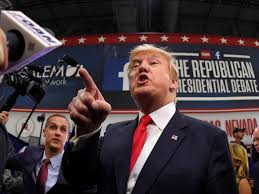di Alia K. Nardini
 In a recent interview featured in The Atlantic, Molly Ball asks Rick Wilson, the controversial Republican strategy consultant, about the possibility of the Republican Party not surviving Donald Trump’s campaign. “Trump,” Wilson notes, “is framing up a scenario where the election in the fall doesn’t become a referendum on the tenure of Barack Obama and Hillary Clinton, but on the Republican positions advanced by Donald Trump—which are not particularly Republican, and not particularly conservative.”
In a recent interview featured in The Atlantic, Molly Ball asks Rick Wilson, the controversial Republican strategy consultant, about the possibility of the Republican Party not surviving Donald Trump’s campaign. “Trump,” Wilson notes, “is framing up a scenario where the election in the fall doesn’t become a referendum on the tenure of Barack Obama and Hillary Clinton, but on the Republican positions advanced by Donald Trump—which are not particularly Republican, and not particularly conservative.”
Wilson’s comment brings our attention to two issues. First, the Grand Old Party must decide on the most effective strategy to adopt in order to win the next presidential election on November 8, 2016. America is now facing major challenges, such as the low purchasing power of wages, the loss of blue collar jobs, exponential increases in costs of health care and higher education, the role of ethnic minorities and their integration into society, and the breakdown of traditional family structures, with its repercussions on childcare and eldercare. In addition to these challenges, the GOP must take into account the new demographic trends, where young people and Latinos are becoming more and more influential voting blocks.
This is particularly relevant in light of William Kristol’s recent observations, noting how Republicans will benefit from a logic of alternation in the 2016 elections, as Democrats have occupied the White House for eight years, and the GOP is currently controlling both houses of Congress. Additionally, the Democratic Party has lost some of its popularity as the general public grows more dissatisfied with the present state of affairs. With an economy in slow recovery – recovery that has yet to be felt by the unemployed and underemployed – and the Obama Administration at low approval ratings, it is crucial for Republicans to reap benefits from the current political situation.
The second issue concerns the general direction in which American conservatism is evolving. It is essential for the Republican Party to provide a univocal answer to this question, not just to gain votes, but to also make up for its longstanding lack of unity and leadership. In fact, party members appear more concerned with tighter controls on illegal immigration, foreign threats and the inadmissibility of any form of abortion, while Democrats occupy higher moral grounds in the discussion on how to improve the healthcare system, develop an economy that cares for those in need, and invest in renewable energy sources. There are no great Republican figures to look up to in this debate, such as Eisenhower and Reagan in the past. A nostalgic spirit remains, instead, raising questions about the future of conservatism within a party that lacks cohesion and direction, whilst experiencing ideological turmoil.
Continuities in the Party
When looking for the main traits characterizing the Republican Party, our search should begin with an economic analysis of the position known as “fiscal conservatism”. Here traditional conservatives happily coexist with the libertarians, displaying continuity also with the Tea Party movement. The common thread is the need to reduce federal government intervention in all business initiatives, while increasing productivity through tax reductions. A prime example of this logic is Mike Huckabee’s position. The former Arkansas Governor and candidate in the 2008 primaries has supported drastic tax cuts to increase purchases and boost the economy, while simultaneously creating new jobs. Also in agreement is Marco Rubio, the young senator from Florida, who would like to raise the retirement age and supports a flat tax at federal level (the same suggestion advanced by libertarian Senator Rand Paul of Kentucky), as opposed to taxing capital gains.
Another point of continuity within the Republican Party is the importance given to constitutional values rooted in the American tradition. Here too, conservatism is relatively consistent: its core beliefs rest upon individual freedoms, such as the right to property and the right to life. Stemming from these convictions are the positions that have always characterized the GOP’s view on ethical issues: public security and the right to self-defense (individually, with the right to bear arms; and at federal level, through an increase in military spending); support of capital punishment; opposition to illegal immigration; free trade and the protection of large companies; meritocracy; school vouchers for private schools, right to homeschooling and teaching of creationism; protection of the unborn starting at conception and rejection of euthanasia; outlawing all drugs (medical and recreational use) and rejecting the decriminalization of soft drugs. These ideas are recurring in the campaigns of candidates such as Rick Santorum, Mike Huckabee and Ted Cruz, most loved by social conservatives. Nevertheless, it is important to note that the libertarian wing of the party (Rand Paul) succeeds in being much more accommodating on ethical issues, whilst still not denying the core values of American conservatism. Although more accepting of civil partnerships and the legalization of soft drugs, as well as non-interventionist in his foreign policy, Paul fully subscribes to the constitutional rights of life, liberty, and property, which conservatives traditionally uphold, while asserting self-determination (personal or at state level) on ethically controversial issues.
Conservative values have important implications in the realm of healthcare. The Affordable Care Act, implemented by Barack Obama in 2010, still classes as a highly important topic in the upcoming elections, with many Republican candidates calling openly for its eradication. For all members of the Republican Party, in line with the conservative tradition, healthcare is a gift to be preserved, rather than a right that is up to the government to guarantee. Currently, the most vocal critic of Obamacare, as well as the most authoritative due to his many years of experience as a neurosurgeon, is Ben Carson, the African American doctor who described the Affordable Care Act as “the worst thing that ever happened in America since slavery.” Instead, Carson proposes savings plans partially funded by the government, transferable to family members in case of death, which would allow citizens to put aside what is necessary to pay for their future treatments and hospitalizations. Others, such as former Ohio Governor John Kasich, support the enlargement and strengthening of Medicaid, or pledge to protect Medicare and the social security system (Huckabee), incurring the anger of Tea Party representatives and of the libertarian front.
Finally, among the defining features of the Republican Party is a strong concept of national interest, framed in anti-totalitarian terms. Since the affirmation of American power overseas in the Spanish-American War and the Philippine-American War, the United States has pursued the same value of freedom against oppressive and authoritarian regimes during and after the twentieth century: from Nazi Germany to Soviet communism, ending with the “rogue states” of George W. Bush. However, few elections in the history of US policy were decided solely by foreign policy issues and positions. A coherent front on the role of America in the world will hardly win Republicans much consensus among swing voters. Nonetheless, the choice to support a vigorous foreign policy has characterized all Republican candidates’ positions, arguing that American interests are best projected abroad by sending troops to the Middle East to fight the Islamic State, strengthening ties with Israel, maintaining a hard line toward Moscow and repealing the nuclear deal with Iran. In this area, “hawks,” such as Senator Lindsey Graham of South Carolina, who also boasts military experience along with his friend John McCain, and Marco Rubio (whom many have called Ronald Reagan’s heir), appear rather competent. Still, candidates such as Trump and Carson are neither been penalized for their lack of knowledge of international affairs, nor have come into conflict with moderates like Kasich, who are adverse to the very idea of culture wars.
Changes and (relatively) new trends
 Although certain continuities in the party are undoubtedly important, there is no doubt that American conservatism is undergoing a deep phase of redefinition. The first controversial issue is how Tea Party members, along with fiscal conservatives and libertarians, argue that government expansion encourages dependency on benefits. Simultaneously, and in contrast with this, Christian social doctrine is gaining more and more support within the party. Its tenants are firmly anchored in Catholic neoconservatism and reflect in the former Senator of Pennsylvania Rick Santorum’s positions, as well as those of the former Florida Governor Jeb Bush‘s compassionate conservatism, modeled on his brother and former President George W. Bush’s proposal. The idea is to rediscover the ethical values of entrepreneurship, while promoting ways in which the community may “help itself” so as not to require federal intervention to address social and economic malaise. In this view, it is important not to abandon the welfare system, rather to reform it in an educational and no-subsidies logic.
Although certain continuities in the party are undoubtedly important, there is no doubt that American conservatism is undergoing a deep phase of redefinition. The first controversial issue is how Tea Party members, along with fiscal conservatives and libertarians, argue that government expansion encourages dependency on benefits. Simultaneously, and in contrast with this, Christian social doctrine is gaining more and more support within the party. Its tenants are firmly anchored in Catholic neoconservatism and reflect in the former Senator of Pennsylvania Rick Santorum’s positions, as well as those of the former Florida Governor Jeb Bush‘s compassionate conservatism, modeled on his brother and former President George W. Bush’s proposal. The idea is to rediscover the ethical values of entrepreneurship, while promoting ways in which the community may “help itself” so as not to require federal intervention to address social and economic malaise. In this view, it is important not to abandon the welfare system, rather to reform it in an educational and no-subsidies logic.
Environmental protection is another controversial issue. The differences within the party here are acute. Part of the GOP in fact rejects any concerns related to climate change, with Donald Trump and Rick Santorum denying any scientific opinion that sees human activity as a cause of global warming. Others, such as Marco Rubio and New Jersey Governor Chris Christie, are more open to compromise, emphasizing how the reduction of CO2 emissions should not hurt US economy or employment prospects rather than dwelling on the causes of ecological damages. Therefore, they implicitly concede that an environmental issue exists, and that it is in the interest and responsibility of the Republicans to provide viable solutions. Disagreements also extend to energy; but while former Hewlett-Packard CEO Carly Fiorina does not even intend to consider a cap and trade system, Huckabee is willing to consider environmental protection regulations. Similarly, a carbon tax is increasingly popular among intellectual conservatives like Mitt Romney, who even included it in his 2012 campaign; and with the influential American Enterprise Institute, which has been actively supporting it since 2008. However, none of the current candidates has taken a public stand in favor of carbon tax. They prefer exploring alternative options, calling for fewer restrictions on oil drilling, increasing fracking, and reconsidering the Keystone pipeline project, even after Obama’s rejection of it in November.
Additionally, deep differences emerge on immigration policies. Gone is President Eisenhower’s historic decision in 1953, when he decided to use refugee assistance policies as a tool to counter Soviet communism during the Cold War. Today, the Grand Old Party has returned to the staunch restrictionist position that characterized the party during the 2008 economic crisis. A Republican party shortsighted to immigration, however, is increasingly unpopular among Latino voters. To counter this potential weakness, the GOP establishment has been particularly supportive of both Marco Rubio and Texas Senator Ted Cruz, who present a certain appeal to the Hispanic electorate in virtue of their Cuban roots. As former Governor of Florida, a state with a large majority of Latinos, Jeb Bush also maintains an open mind regarding the immigration issue. In contrast, Donald Trump has repeatedly stated that he would forcibly repatriate all illegal immigrants, build a wall on the border with Mexico (forcing the Central American country to bear its cost), and re-examine the status of children born on American soil by non-resident parents, often using the derogatory term “anchor babies” in referring to their status.
Finally, the role of the Washington establishment in the party is under scrutiny. Although a “dissident” countenance has always been relatively able to gain consensus among voters, there have never been so many candidates in the Republican primaries who are so consciously and vocally setting themselves apart from the world of politics. Many lack any political experience whatsoever (Fiorina, Carson, Trump); others have never been appointed Governors (Rubio, Paul, Cruz, Santorum); others still point at their young age – thus inexperience – with pride (Rubio and Cruz are both 44); or to their willingness to speak to ordinary people (the straight-talking, no nonsense language of Huckabee and Christie). Added to Trump’s displays of extreme populism, the emerging picture is that being connected with Washington, like Christie or Bush are, could be detrimental in the upcoming primaries. The party will therefore need to tread carefully the thin line between competence and skilful policymaking, and being tied to (and dependent on) the interest of the establishment. In this sense, even before facing their eventual Democratic opponent, Republicans need to solve their internal contradictions, as most apparent when juxtaposing Jeb Bush, the candidate who appeals to conservative media, can count on his political credentials and family ties, and receives support from the big powers in Washington; and Ted Cruz, with his powerful rhetoric and intense opposition to Obama, who is well liked by the Christian right, some libertarians, and Tea Party members. In this sense, Cruz speaks for those who are persuaded that the establishment – of both parties – does not really care about the issues and priorities that really matter to most Americans.
This relates to the broader question concerning the paucity of intellectual debate taking place among conservatives today, characterized by the progressive loss of confidence in long-established and respected organizations such as the Heritage Foundation and The National Review. The strategy of the young guns, who in years 1994-1995 re-launched the GOP through Newt Gingrich’s Contract with America, is now weakening the party and making it more extreme and volatile, as demonstrated by the resignation of the Speaker of the House John Boehner. Traditional conservatives now all appear to be centrists, not so much in principle (as values have not changed greatly), but in their ways of doing politics (their intellectual baseline, their propensity for dialogue with the opposition, and their relations with the establishment). In this sense, the choice of Paul Ryan as the new speaker is an attempt to realign the party with traditional conservatism with regard to principles, whilst being no less confrontational with the incumbent President and the Democrats. It will be interesting to see if this line holds against the blows of the outsiders.
Conclusion
The biggest risk for the Republican Party at the moment is the surprising amount of consensus (and thus power) collecting in the single-issue, ultraconservative fringes within the party itself – such as the fiscal, religious and social conservatives. Such ultraconservatism results in statements and radical positions that will harm the Republicans in the long run, as the presidential campaign against their Democratic opponent who will undoubtedly take a more moderate approach. The alternative for the GOP appears to be a somewhat fractured party, where the radicalization of the anti-abortion positions (no-rape exception), the denial of environment concerns and the fight against illegal immigration are pitted against more flexible positions on civil unions (Christie, Fiorina), emergency contraception in cases of rape, or the termination of pregnancy when the mother’s life is at risk; regularizing immigration (Jeb Bush, Rubio), and allowing marijuana for medical use (Christie).
A second – and possibly more serious – scenario sees the party as unable to “absorb” the Trump phenomenon, and more generally its internal tendency towards radicalization. In this sense, with his demagoguery, excesses and unlimited funds, Trump is undoubtedly hurting the GOP, both electorally and philosophically. The tycoon could even opt to run as an independent – a catastrophic decision for the Republicans, as this would irreparably divide the party and pave the way for a third consecutive victory for the Democrats in 2016.







Lascia un commento